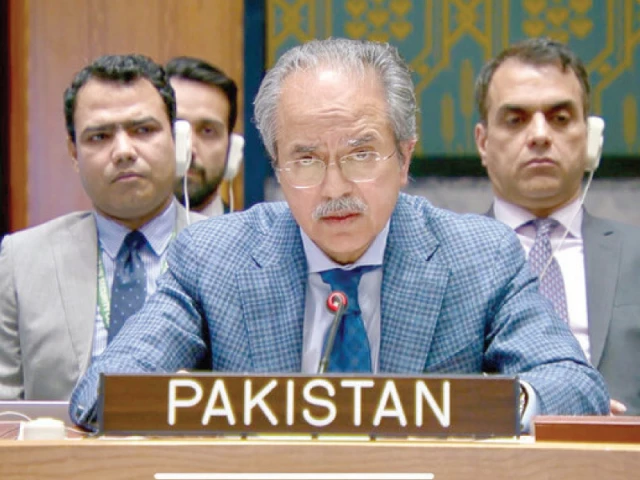Permanent Representative of Pakistan to the UN Ambassador Asim Iftikhar Ahmad. photo: file
Pakistan has raised the alarm to the United Nations over abandoned and illegally transferred small arms and light weapons in Afghanistan, warning that they threaten regional peace and security.
Ambassador Asim Iftikhar, Pakistan’s Permanent Representative to the United Nations, told the Security Council during an open debate on small arms that uncontrolled accumulation of weapons fuels conflict.
“Small arms are neither small nor light in their effect. They are the second most used weapon in global terrorist attacks after explosives,” he said.
The envoy expressed deep concern about stockpiles of sophisticated weapons and ammunition left in Afghanistan, either abandoned by foreign forces or sold illegally on black markets. “Reports indicate that these weapons pose a direct threat to neighboring countries,” he said.
He warned that terrorist groups – including ISIL-K, TTP, Baloch Liberation Army (BLA), referred to as “Fitna al-Khawarij” by the ISPR, and the Majeed Brigade – have acquired and used these modern weapons against Pakistani civilians and law enforcement, causing thousands of deaths.
“The movement of unmarked or unregistered weapons across borders supports non-state armed groups, terrorist networks and criminal gangs, undermining regional security,” he added. Pakistan called for stronger international efforts to prevent illicit arms flows and urged Afghan authorities to honor their commitments.
Read: Pakistan favors talks with Afghanistan, Senate told
Ambassador Iftikhar also highlighted the challenges posed by new technologies, including AI-based weapons, drones, 3D-printed firearms, night vision equipment and cryptocurrency-enabled arms deals, which complicate efforts to control illegal weapons.
He emphasized the United Nations Program of Action on the Illicit Trafficking in Small Arms and Light Weapons as a framework for global cooperation and called for its full implementation nationally and internationally to ensure peace and security.
Evolving threats and the need for global cooperation
Alongside small arms, Pakistan emphasized its long-standing contribution to UN peacekeeping. The envoy noted that Pakistan hosts one of the first UN missions, the United Nations Military Observer Group in India and Pakistan (UNMOGIP), and is among the largest and longest serving troop contributors globally.
“Over seven decades, more than 237,000 Pakistani peacekeepers have served in 48 missions across four continents, 182 of whom have made the ultimate sacrifice for international peace and security,” he said.
He warned that UN peacekeeping is at a “critical crossroads”, facing political, financial and operational pressures, including an ongoing liquidity crisis caused by declining commitment from some member states.
Despite these challenges, he said, peacekeeping remains highly effective and cost-effective, with an annual budget of around $5.5 billion – less than 0.3% of global military spending – saving lives, monitoring ceasefires, protecting civilians and stabilizing fragile regions.
Ambassador Iftikhar outlined several initiatives to strengthen UN peacekeeping operations. He said mandates must be realistic, achievable and driven by political objectives, while troop- and police-contributing countries must be fully involved in mandate formulation, review and transitions, which should be based on conditions rather than fixed calendars.
Read more: A common horizon: why Pak-Afghan ties matter
The safety and security of peacekeepers must remain a top priority with stronger accountability and deterrence measures. He called for the strengthening of regional partnerships under Chapter VIII, as promoted by Security Council Resolution 2719, and emphasized that technology and innovation should complement, not replace, human presence. New mission arrangements must preserve the neutrality, legitimacy and accountability of UN peacekeeping, and the Special Committee on Peacekeeping Operations (C-34) must remain actively engaged to ensure legitimacy and Member State ownership of decisions.
“Pakistan does not view peacekeeping as a panacea, but not a useful one either,” he added, reaffirming the country’s commitment to ensuring that UN operations remain credible, adequately resourced and firmly rooted in the principles of the UN Charter.



